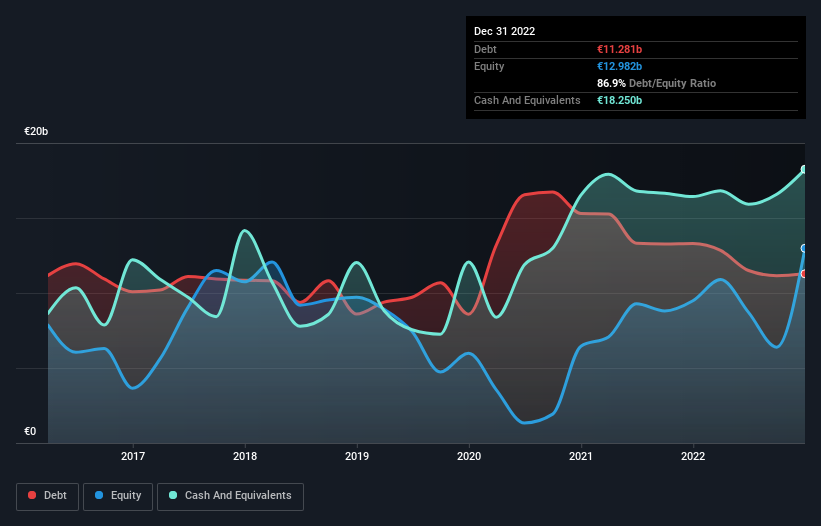
David Iben put it well when he said, 'Volatility is not a risk we care about. What we care about is avoiding the permanent loss of capital.' It's only natural to consider a company's balance sheet when you examine how risky it is, since debt is often involved when a business collapses. We note that Airbus SE (EPA:AIR) does have debt on its balance sheet. But is this debt a concern to shareholders?
When Is Debt A Problem?
Debt is a tool to help businesses grow, but if a business is incapable of paying off its lenders, then it exists at their mercy. If things get really bad, the lenders can take control of the business. While that is not too common, we often do see indebted companies permanently diluting shareholders because lenders force them to raise capital at a distressed price. Of course, debt can be an important tool in businesses, particularly capital heavy businesses. When we examine debt levels, we first consider both cash and debt levels, together.
Check out our latest analysis for Airbus
What Is Airbus's Net Debt?
The image below, which you can click on for greater detail, shows that Airbus had debt of €11.3b at the end of December 2022, a reduction from €13.3b over a year. However, its balance sheet shows it holds €18.3b in cash, so it actually has €6.97b net cash.

How Strong Is Airbus' Balance Sheet?
According to the last reported balance sheet, Airbus had liabilities of €52.6b due within 12 months, and liabilities of €50.4b due beyond 12 months. Offsetting this, it had €18.3b in cash and €9.99b in receivables that were due within 12 months. So its liabilities outweigh the sum of its cash and (near-term) receivables by €74.7b.
This is a mountain of leverage even relative to its gargantuan market capitalization of €96.0b. This suggests shareholders would be heavily diluted if the company needed to shore up its balance sheet in a hurry. While it does have liabilities worth noting, Airbus also has more cash than debt, so we're pretty confident it can manage its debt safely.
Fortunately, Airbus grew its EBIT by 6.6% in the last year, making that debt load look even more manageable. The balance sheet is clearly the area to focus on when you are analysing debt. But it is future earnings, more than anything, that will determine Airbus's ability to maintain a healthy balance sheet going forward. So if you want to see what the professionals think, you might find this free report on analyst profit forecasts to be interesting.
Finally, a company can only pay off debt with cold hard cash, not accounting profits. While Airbus has net cash on its balance sheet, it's still worth taking a look at its ability to convert earnings before interest and tax (EBIT) to free cash flow, to help us understand how quickly it is building (or eroding) that cash balance. Considering the last three years, Airbus actually recorded a cash outflow, overall. Debt is far more risky for companies with unreliable free cash flow, so shareholders should be hoping that the past expenditure will produce free cash flow in the future.
Summing Up
While Airbus does have more liabilities than liquid assets, it also has net cash of €6.97b. And it also grew its EBIT by 6.6% over the last year. So while Airbus does not have a great balance sheet, it's certainly not too bad. Over time, share prices tend to follow earnings per share, so if you're interested in Airbus, you may well want to click here to check an interactive graph of its earnings per share history.
At the end of the day, it's often better to focus on companies that are free from net debt. You can access our special list of such companies (all with a track record of profit growth). It's free.
New: Manage All Your Stock Portfolios in One Place
We've created the ultimate portfolio companion for stock investors, and it's free.
• Connect an unlimited number of Portfolios and see your total in one currency
• Be alerted to new Warning Signs or Risks via email or mobile
• Track the Fair Value of your stocks
Have feedback on this article? Concerned about the content? Get in touch with us directly. Alternatively, email editorial-team (at) simplywallst.com.
This article by Simply Wall St is general in nature. We provide commentary based on historical data and analyst forecasts only using an unbiased methodology and our articles are not intended to be financial advice. It does not constitute a recommendation to buy or sell any stock, and does not take account of your objectives, or your financial situation. We aim to bring you long-term focused analysis driven by fundamental data. Note that our analysis may not factor in the latest price-sensitive company announcements or qualitative material. Simply Wall St has no position in any stocks mentioned.
About ENXTPA:AIR
Airbus
Engages in the design, manufacture, and delivery of aerospace products, services, and solutions worldwide.
Flawless balance sheet with high growth potential.


